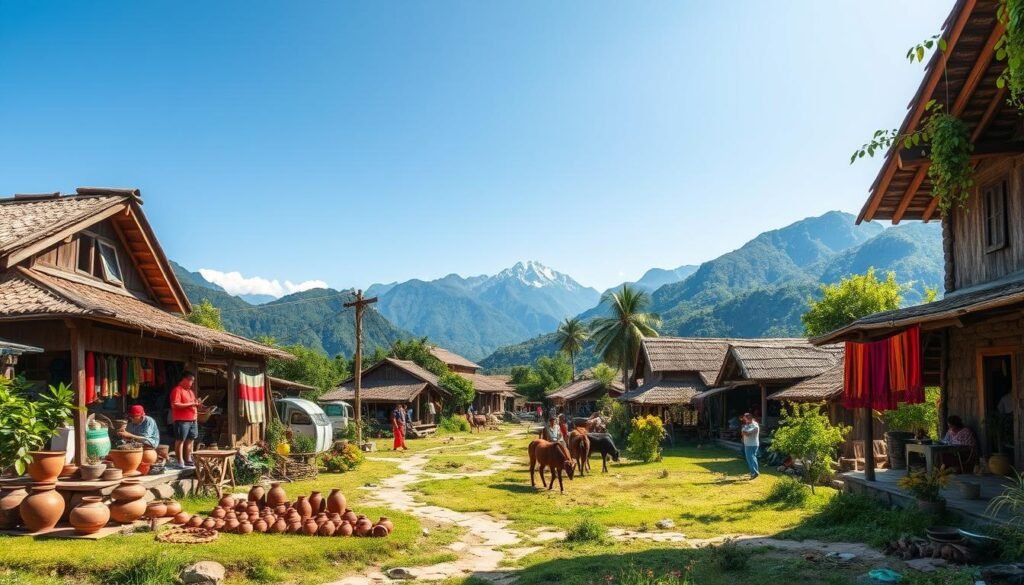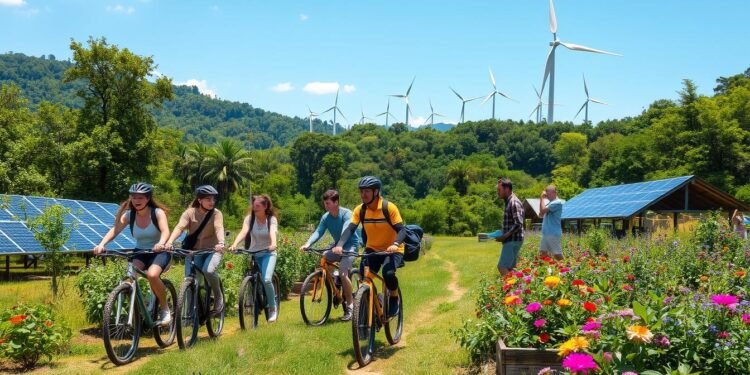In today’s world, where saving the planet is key, sustainable travel is changing how we explore. The World Tourism Organization (UNWTO) says sustainable tourism looks at its economic, social, and environmental impacts. It’s about keeping our planet safe while also helping local communities thrive.
Sustainable travel, also known as eco-tourism, is getting more popular. It focuses on three main areas: protecting the environment, supporting local people, and helping the economy. By making smart choices, travelers can have a positive impact on the places they visit.
Key Takeaways
- Sustainable travel is a comprehensive approach that considers environmental, social, and economic impacts.
- Sustainable tourism benefits local communities by supporting businesses and cultural traditions.
- Eco-friendly practices, such as using public transportation and reducing waste, can significantly reduce a traveler’s carbon footprint.
- Choosing locally owned accommodations and activities helps to directly support the local economy.
- Respecting local customs and engaging with communities responsibly are essential for cultural sensitivity in travel.
Understanding Sustainable Travel
Sustainable travel, also known as green travel or low-impact travel, is a way to travel that cares for the planet and people. It means choosing options that are good for the environment and support local communities. This includes picking eco-friendly places to stay, how you get there, and what you do when you arrive.
What is Sustainable Travel?
The World Tourism Organization (UNWTO) says sustainable travel is about thinking of the now and the future. It looks at the economic, social, and environmental effects of tourism. It focuses on three key areas: protecting the environment, supporting local people, and keeping the economy strong.
Benefits of Sustainable Travel
- It helps reduce harm to the environment by cutting down on pollution and saving resources.
- It boosts local economies by helping businesses grow and creating jobs.
- It helps keep cultural traditions alive by respecting local ways of life.
- It makes travel more meaningful by connecting visitors with the local culture.
Practicing sustainable travel means choosing eco-friendly places to stay and how to get there. It also means supporting local businesses and taking your time to enjoy the journey. By doing this, travelers help keep destinations beautiful for others to enjoy in the future.
Supporting Local Communities
Sustainable travel is more than just protecting the environment. It’s also about helping the local communities we visit. By choosing local businesses and community-based tourism, we can positively impact their economies.
Why Local Economies Matter
Supporting local economies helps money stay in the destination. This boosts growth and keeps traditional crafts and cultural practices alive. Community-based tourism lets travelers directly support residents, ensuring tourism benefits everyone.
Ways to Support Local Businesses
- Dine at local restaurants and cafes, rather than international chains
- Shop at local markets, artisan workshops, and small businesses
- Stay in locally-owned accommodations, such as guesthouses or homestays
- Participate in community-based tours and activities that showcase local culture and traditions
- Donate to local charities, non-profits, or social enterprises working to address community needs
By choosing to ethical travel and support local economies, tourists are crucial to a destination’s long-term success.
“Sustainable tourism is about empowering local communities and ensuring the benefits of travel are equitably distributed.”
Protecting the Environment
Sustainable travel is more than just helping local communities. It’s also key for protecting our planet. The tourism industry is a big source of greenhouse gas emissions, contributing to climate change. As travelers, we can make a difference by reducing our impact and helping preserve the places we visit.
Key Environmental Issues in Tourism
Environmental problems in tourism include carbon emissions, waste, and harm to local ecosystems and wildlife. We can help by adopting green practices on our travels.
Sustainable Practices Travelers Can Adopt
- Choose eco-friendly transportation options: WWF suggests picking destinations closer to home or using transport other than planes to cut emissions.
- Reduce single-use plastics: Use reusable water bottles, avoid disposable straws, and dispose of waste properly.
- Participate in conservation efforts: Many companies offer carbon-neutral travel and conservation travel to support sustainable development and protect the environment.
- Pack light to reduce fuel consumption: Less luggage means less fuel needed, cutting emissions.
- Choose eco-friendly accommodations: Look for hotels that focus on sustainability, like waste treatment, recycling, and energy efficiency.
- Engage in responsible wildlife tourism: Avoid souvenirs from endangered species and choose activities that respect wildlife and their habitats.
By following these sustainable practices, we can significantly reduce the tourism industry’s negative impact. It’s our duty to travel responsibly and protect the world’s natural wonders for future generations.
“Responsible travel involves individuals ensuring that their journeys contribute positively to themselves, local communities, and the current and future economic health of tourism destinations.”
| Sustainable Travel Initiative | Key Focus Areas |
|---|---|
| WWF Travel Helper | Provides guidance on the best ways to travel, including options like driving, taking the train, or selecting airlines with higher occupancy rates and more efficient aircraft. |
| EF Responsible Travel | Supports local communities, promotes animal welfare, and protects the environment. Includes initiatives like the EF Forest Initiative, which has planted over 7 million mangrove trees in partnership with Eden Reforestation Projects. |
| One Planet Lifestyle (WWF) | Encourages sustainable living practices and protects the environment, with a focus on promoting eco-friendly practices and regenerative solutions. |
Choosing Sustainable Accommodations
As eco-conscious travelers, picking sustainable places to stay is key. Eco-friendly hotels, lodges, and community-run stays are great. They help reduce your carbon footprint and support local economies.
Eco-Friendly Hotels and Lodging Options
Eco-friendly places use renewable energy and save water. They also build with local materials. These green hotels aim to lessen their environmental impact. Look for places with LEED or Green Seal certifications for the best sustainability.
Community-Run Stays: A Unique Experience
Choosing community-run places like eco-lodges lets you dive into local culture. You also help the community by supporting their economy. This way, your travel money goes back to the locals, helping jobs and traditions.
When picking places to stay, think about energy use, waste, and materials. By choosing eco-friendly accommodations, you help the planet and support local communities.
| Eco-Friendly Accommodations | Community-Run Stays |
|---|---|
| Utilize renewable energy sources | Provide authentic cultural experiences |
| Implement water conservation measures | Reinvest in local economies |
| Use locally-sourced materials | Preserve traditional ways of life |
| Hold eco-certifications | Offer unique, immersive stays |

“Sustainable travel is not just about reducing our environmental impact, but also about supporting local communities and preserving cultural heritage. By choosing eco-friendly accommodations and community-run stays, we can create a more meaningful and responsible travel experience.”
Eco-Conscious Transportation Options
Sustainable travel is about more than just where we go. It’s also about how we get there. Our choices in transportation can greatly affect the environment. By choosing eco-friendly ways to travel, we can lower our carbon footprint and help sustainable transportation efforts.
Public Transport vs. Car Rentals
Public transport is a greener option than renting a car. Buses, trains, and subways help us move around cities without harming the environment. They also support local infrastructure and help create a better transportation system.
The Benefits of Walking and Biking
Walking and biking are great for short trips. They cut down on carbon emissions and let us see the local area up close. By choosing to walk or bike, we make our travels more meaningful and help keep the environment clean.
“Sustainable travel is about making conscious choices that prioritize the well-being of the planet and the communities we visit. By selecting eco-conscious transportation options, we can minimize our environmental impact and contribute to a more sustainable future.”
Even when we must fly, we can still choose to travel sustainably. Opting for economy class and direct flights can help reduce our carbon footprint. For longer trips, trains are often a greener choice than flying. By using these eco-friendly travel options, we can make a big difference in reducing our environmental impact.
Cultural Sensitivity in Travel
Responsible tourism is more than just protecting the environment. It’s also about respecting the culture and traditions of where we go. As travelers, we must connect with local communities in a thoughtful way. This helps us understand and appreciate each other more.
Respecting Local Customs and Traditions
Before we visit a new place, we should learn about its culture. This means knowing the local customs, what to wear, and how to act. By doing this, we show respect and avoid causing any offense.
Engaging with Local Communities Responsibly
Traveling sustainably is more than just seeing sights. It’s about connecting with locals in a way that helps them. This could be by joining cultural events or supporting local businesses. When we meet community members, we should be open-minded and eager to learn. This way, we help preserve their culture.
“Sustainable tourism prioritizes the well-being of destinations and their resources, balancing economic, ecological, and social aspects.”
By being culturally sensitive on our travels, we help the responsible tourism movement. This approach makes our trips better for us and for the communities we visit. It also protects the rich cultural heritage of our world.

Responsible Wildlife Tourism
Eco-tourism and wildlife conservation go together. Travelers want to connect with nature and help endangered species. Responsible wildlife tourism focuses on ethical animal encounters and helps protect habitats and animals.
Ethical Animal Encounters: What to Look for
When picking wildlife experiences, avoid places that harm animals for fun. Look for sanctuaries, reserves, and tours that care about animal welfare. Choose operators linked to groups like the World Wildlife Fund or Conservation International.
Good wildlife tourism keeps visitor numbers low to not disturb animals. It teaches guests how to behave, like keeping a safe distance and not using flash. This way, travelers can see amazing wildlife while respecting nature.
Supporting Wildlife Conservation Efforts
Supporting wildlife conservation is easy. You can donate to good causes, volunteer, or share your experiences. In Costa Rica, sustainable tourism has grown, with eco-lodges and community tourism. These help the environment and support local people.
More people want to make a difference through travel. By choosing the right wildlife experiences and supporting conservation, tourists help protect animals and their homes for the future.
| Destination | Focus | Conservation Efforts |
|---|---|---|
| Zagros Mountain Trail, Kurdistan | Sustainable hiking and ecotourism | 215 km long trail that boosts local economy and preserves the natural environment |
| Le Village Des Tortues, Senegal | Rehabilitating mistreated tortoises | Offers educational experiences to visitors |
| Borneo Orangutan Survival Foundation, Indonesia | Protecting endangered orangutans | Provides opportunities for visitors to engage in conservation efforts through donations and volunteering |
By supporting eco-tourism and wildlife conservation, travelers can make a big difference. They get to see the world in a new way and have unforgettable experiences.
Planning Your Sustainable Trip
Planning a sustainable trip means using many resources and services that care about the planet. Online platforms and guidebooks now highlight eco-friendly travel choices. They offer tips on green hotels, responsible tours, and places that protect nature and culture.
Resources for Sustainable Travel
There are many tools to help plan trips that match your values. You can find blogs and green hotel directories online. These resources help you choose places that are good for the environment and support local communities.
Travel Agencies Specializing in Responsible Tourism
Working with travel agencies focused on responsible tourism makes planning easier. These agencies create trips that are good for the planet. They connect you with green hotels, local guides, and tours that help protect the environment.















